 Petzlover
Petzlover Grand Bleu de Gascogne is originated from France but Komondor is originated from Hungary. Both Grand Bleu de Gascogne and Komondor are having almost same height. Grand Bleu de Gascogne may weigh 18 kg / 39 pounds lesser than Komondor. Both Grand Bleu de Gascogne and Komondor has same life span. Grand Bleu de Gascogne may have less litter size than Komondor. Grand Bleu de Gascogne requires Low Maintenance. But Komondor requires High Maintenance
Grand Bleu de Gascogne is originated from France but Komondor is originated from Hungary. Both Grand Bleu de Gascogne and Komondor are having almost same height. Grand Bleu de Gascogne may weigh 18 kg / 39 pounds lesser than Komondor. Both Grand Bleu de Gascogne and Komondor has same life span. Grand Bleu de Gascogne may have less litter size than Komondor. Grand Bleu de Gascogne requires Low Maintenance. But Komondor requires High Maintenance
 The Grande Bleu de Gascogne is a dog which has descended from a line of French hounds. Originating in France, the dog is actually more common in the United States than in France.
The Grande Bleu de Gascogne is a dog which has descended from a line of French hounds. Originating in France, the dog is actually more common in the United States than in France.
They were bred to hunt, and today they continue to be used for hunting, but they double up as loyal pets too.
It is believed that they descended from dogs such as the St. Hubert Hound and the English Southern Hound. The dog itself has had an influence on the development of several scent-hound breeds.
In the United States, the Grande Bleu de Gascogne was bred in the 18th century already, displaying typical pack hound behavior.The dog isn't recognized by the AKC but he is recognized by other kennel clubs as a scenthound.
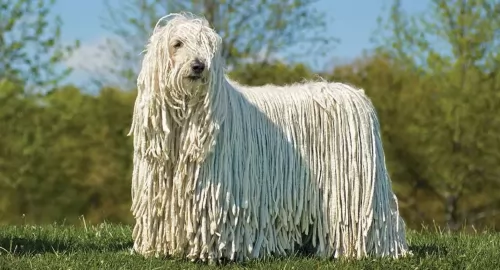 Looking like a giant mop, and sometimes being referred to as 'mop dogs' the Komondor, known also as the Hungarian sheepdog, hails from Hungary.
Looking like a giant mop, and sometimes being referred to as 'mop dogs' the Komondor, known also as the Hungarian sheepdog, hails from Hungary.
The dog was brought to Europe centuries ago so he is a well established breed. It has been declared as one of the country's national treasures.
He is a dog related to many other dogs such as the Pulim the Ovcharka, the Bearded Collie, Old English Sheepdog and others.
 The Grand Bleu de Gascogne is a large dog, standing at 65–72cm with the female usually being slightly smaller at 62–68cm. The dog weighs about 36 to 42kg.
The Grand Bleu de Gascogne is a large dog, standing at 65–72cm with the female usually being slightly smaller at 62–68cm. The dog weighs about 36 to 42kg.
He has a lean, muscular body with long legs, long ears and with a strong, noble appearance. The coat is short and smooth and the color of the coat is white and black mottled. In some instances, there'll be large patches of black over the back of the dog. The head and neck area can also be black. There are tan markings above each eye.
This is a gentle dog, not aggressive at all, and he just wants to get on with hunting. He is a social dog and loves to be around other familiar dogs and his human family. He essentially wants to live in the country where he can be busy and active with tasks to do.
If you leave him alone for too long, he becomes frustrated and resorts to baying. He can get on well with adults and children in the home, but tends to be aloof around strangers. He is an intelligent animal, and training and socialization will be important for him, especially since he is independent and likes doing things his way.
The training will make him obedient and he'll always know how to behave well around strangers.
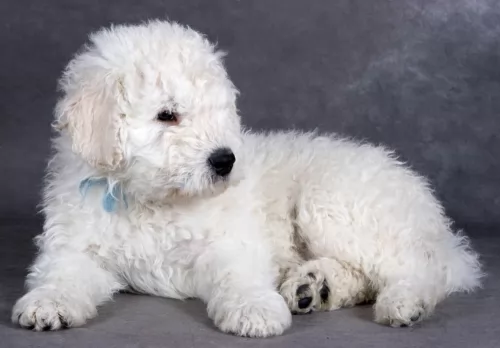 Known for his unique long corded, singular white coat, the Komondor, a molosser dog, is large. Females start at 64cm in height and both males and females can reach up to 76cm in height.
Known for his unique long corded, singular white coat, the Komondor, a molosser dog, is large. Females start at 64cm in height and both males and females can reach up to 76cm in height.
This unusual coat of theirs is wavy and actually forms cords or dreadlocks as the dog matures. You can't easily see the dog's face because of all the hair.You also can't see the tail easily, in fact you might think he hasn't got a tail as it is obscured by the hair. The tail is medium length and held low.
He has a large head, dark brown eyes, and floppy ears. The coat is certainly going to require grooming even though the dog doesn't shed much. His body is robust and well muscled with the body being slightly longer than the height of the dog.
The Komondor has been a dog used for guarding livestock, and while his character is calm and balanced, when the livestock is threatened, he can show another side – more aggressive – as he defends his flock. He makes an excellent watchdog.
He is an affectionate dog with his human family, being a gentle playmate of children. He is slightly reserved and wary of strangers, and is willing to guard and protect his human family from them.
He is also good with other family pets. When you look at him you might think of him as not being very energetic, but he is an athletic dog, fast and powerful. Because of his size and speed, it is best to have him trained and socialized as he can be obstinate. Training him makes him obedient.
 Your beautiful hunting dog is active and social and just loves to be out and about following a scent with other hunting dogs. This is what he absolutely loves to do.
Your beautiful hunting dog is active and social and just loves to be out and about following a scent with other hunting dogs. This is what he absolutely loves to do.
These days, apart from just hunting, he is also kept as a pet. He makes a good family companion because he is a non aggressive, gentle, even-tempered pet. Some of these dogs tend to be more reserved in nature. However your dog turns out, he can be your special friend when you give him all the exercise, nutrition and love that such a loyal dog deserves.
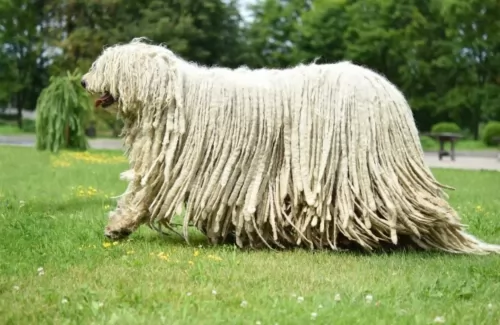 The Komondor is known for his strong guardian characteristics, especially with his human family. He is loving and loyal towards them while being wary of strangers.
The Komondor is known for his strong guardian characteristics, especially with his human family. He is loving and loyal towards them while being wary of strangers.
True, his coat can make people think twice before making this dog a pet, but if you're game and ready to attend to his coat, he can make an excellent family pet. They're fine with other pets too, and he is also an intelligent dog, capable of being easily trained.
He needs a good deal of exercise and can become noisy and destructive without the right amount of stimulation. If you do your part with the Komondor and provide him with a loving, caring home, he will be an awesome pet and guard you with his life.
 As a dog not known for inherited health problems, the Grande Bleu de Gascogne, with good care, can live to be 12 years of age.
As a dog not known for inherited health problems, the Grande Bleu de Gascogne, with good care, can live to be 12 years of age.
Just like with other dog breeds, there are some conditions to which this dog may also be prone, and hip dysplasia is one.
The average litter size for the Grande Bleu de Gascogne is 4 to 7 puppies. It is important to prevent your puppy growing too quickly because this is precisely what leads to musculoskeletal problems as an adult.
If you're concerned about this, speak to your vet, as you want to do your best to prevent hip problems in the future.
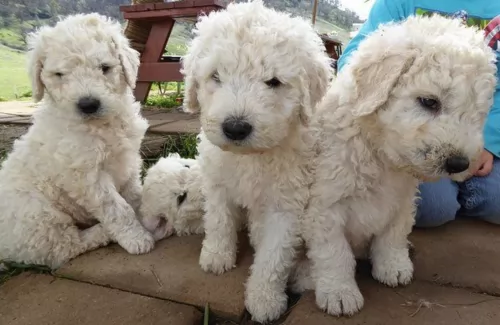 The Komondor is a healthy dog breed who can live to be 10, 11 or 12 years if you look after him well. There aren't any known genetic disorders prominent with the dog, but it pays to know about some of those that could strike -
The Komondor is a healthy dog breed who can live to be 10, 11 or 12 years if you look after him well. There aren't any known genetic disorders prominent with the dog, but it pays to know about some of those that could strike -
This is an irritating eye problem where the eyelash rubs up against the eyes.The result can be scratching of the cornea and eye infections. It is an eye problem which can be corrected with surgery.
Hip dysplasia is a serious genetically inherited disorder and common in large dog breeds. It is caused by a malformation of the hip joint. It can cause problems for the dog, weakening the hip and making it incapable of supporting the weight of the dog.
It also leads to pain for the dog, difficulty with moving and even total lameness. Weight, size of dog, age and genetics are all factors which can increase the dog's likelihood of developing hip dysplasia.
Whimpering, lethargy and refusing to put weight on the leg are common signs of hip dysplasia and your vet will go ahead with ways to relieve the pain and symptoms of your Komondor.
 Known for his hunting skills, the Grande Bleu de Gascogne has high exercise requirements. Although a walk is wonderful for him, it won't be enough. If you have a large garden, which will be ideal for him, throw the ball so he can fetch it. If you go cycling or jogging, he'll thank you for including him in these.
Known for his hunting skills, the Grande Bleu de Gascogne has high exercise requirements. Although a walk is wonderful for him, it won't be enough. If you have a large garden, which will be ideal for him, throw the ball so he can fetch it. If you go cycling or jogging, he'll thank you for including him in these.
The Grand Bleu’s short coat is conveniently low maintenance too so you aren't going to be spending anything on professional grooming. Give him a brush twice a week to remove loose hairs and to keep his coat silky and shiny.
Their long ears should be checked regularly for a build up of wax and dirt. Dampness can also be a problem if he loves to go swimming. You can buy special ear-cleaning-for-dog products. Never probe deep in the ears as you can damage them. Rather get advice from your vet or professional groomers on how to keep the inside of his ears clean and free from infection.
An energetic hunting scentdog like this requires high quality food with some raw meat added in from time to time. He must always have access to fresh, cool water.
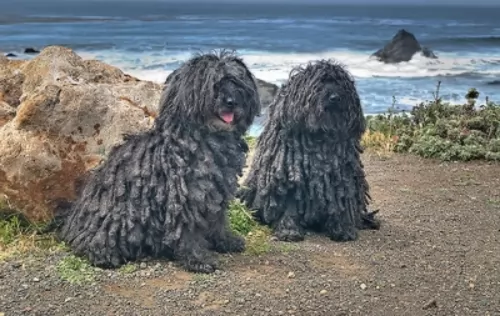 The Komondor is most certainly not a low maintenance dog with that extraordinary coat.Before the dog turns 1, the coat begins to form its cords. These cords can become discolored and matted, In fact the cords will need to be separated to keep the dog clean and free of matted hair.
The Komondor is most certainly not a low maintenance dog with that extraordinary coat.Before the dog turns 1, the coat begins to form its cords. These cords can become discolored and matted, In fact the cords will need to be separated to keep the dog clean and free of matted hair.
For those who keep the dog as a pet and who don't want him to be a show dog, he can be trimmed, otherwise the coat and its maintenance could turn out to be a real issue.
Of course once the distinctive coat has been sheared, he loses that typical and recognizable Komondor look.
Check his ears on a regular basis for wax- and dirt buildup so as to prevent ear infection.
Teeth need to be checked regularly to prevent tartar buildup and if you don't have the time or the knowledge to keep his teeth clean and maintained, take him to the vet as the teeth-treatments they do there will promote healthy teeth and gums.